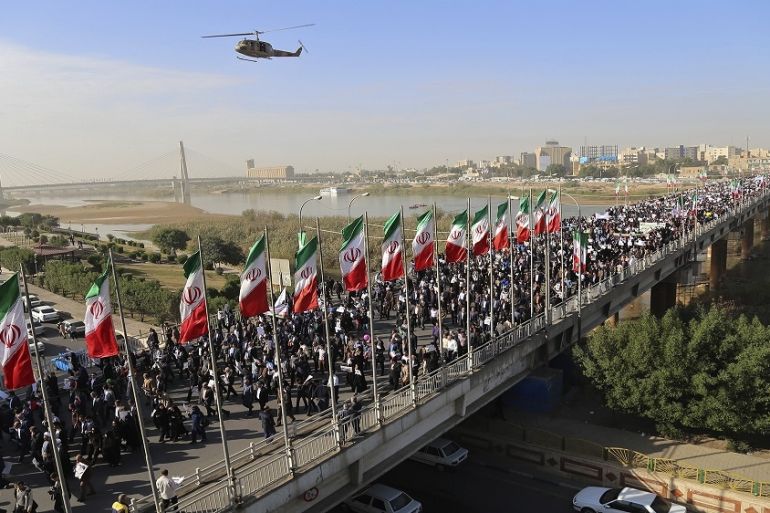Q&A: ‘This is a fight among Iran’s ruling factions’
Saeed Laylaz, former adviser to reformist leader Khatami, discusses the causes and possible effect of ongoing protests.

Nationwide anti-government protests have left nearly two dozen people dead and hundreds of others arrested across Iran.
Erupting amid growing public discontent over widespread unemployment and economic inequality, the protests have taken on an anti-government message and new calls for mass rallies were heard this week.
For its part, the Iranian state mobilised thousands of supporters to march “against rampage and disrespect”.
The Iranian authorities have accused groups inside the country foreign adversaries of fomenting anger against the government of Hassan Rouhani, Iran’s president, who was re-elected in May.
Rouhani’s landslide victory came after a bitter campaign against hardline candidates Mohammad Baqer Qalibaf, Tehran’s powerful mayor at the time, and Ebrahim Raeesi, head of the massive state-conglomerate Astan Qods Razavi, which is headquartered in Mashhad.
The protests first erupted in Mashhad, Iran’s second-largest city, which is also where Raeesi’s father-in-law, Ayatollah Ahmad Alamolhoda, leads the Friday prayers.
The ongoing protests are the most recent challenge to Rouhani, whose ministerial picks turned many of his reformist supporters into critics.
Last month, the government submitted a budget bill for the next fiscal year. Part of its plan to carry out partial economic reforms, including increasing fuel prices and reducing subsidies, the budget generated discontent among low-income Iranians.
The bill revealed the huge costs incurred by religious bodies, whose budgets had been largely unknown prior to that point, sparking further anger and criticism.
These incidents are not unrelated, says senior Iranian economist Saeed Laylaz, a professor at Shahid Beheshti University in Tehran.
Laylaz, who is considered sympathetic to Rouhani, was an adviser to Iran’s former reformist President Mohammad Khatami and an outspoken critic of his successor, Mahmoud Ahmadinejad.
Al Jazeera spoke to him about the reasons behind the widespread protests and their potential impact.
Al Jazeera: It looks like there is a consensus that Iranian hardliners ignited the protests. What do you think?
Saeed Laylaz: Alamolhoda, Raeesi and Qalibaf started it and Ahmadinejad is extending it. It is, I think, a fight among the factions inside the establishment.
Part of it is to take revenge after the election and part of it is about the succession [to the supreme leader].
We’re not facing a protest by the people alone. We’re dealing with specific groups. In small cities, they attack to capture police stations. Does a [low-income] teacher, for instance, do that?
Al Jazeera: Is this related to Rouhani’s budget bill as well?
Laylaz: It is.
So far, they (the hardliners) have fulfilled their goal. The structure of the budget is back to where it was and it is no longer possible to carry out reforms.
As a result of the protests, the reforms Rouhani had decided to push through – as simplistic and inefficient as they were – will be stopped.
The budget has two characteristics. First, it is the most transparent budget drafted after the Islamic Revolution.
Second, it clearly reflects the political and economic crises in the country.
The same groups that were upset because their budgets were revealed might be playing a role in the unrest.
Al Jazeera: Why did Rouhani increase the budgets of organisations he thinks should not spend as much as they do, and then make it public?
Laylaz: Not only has the budget for some of those bodies increased, but they want more. They say the increase is not enough. If Rouhani does not increase their budget, they won’t stand it.
In places whose budgets are rising, he has been under pressure. If you look closely, the budget for the parliament has been reduced. The budget for the Guardian Council (a constitutionally mandated 12-member body that wields considerable power and influence) has also been reduced in the budget bill.
But, so far, the Guardian Council has not accepted the reduction to its budget and it has rejected the bill.
Al Jazeera: Are the protests related to anger among Rouhani’s supporters? Many of them were disappointed after an apparent shift where the president became more closely aligned with conservatives, the opposite of promises he made before the election.
Laylaz: People are disappointed in Rouhani, but those who are disappointed are not on the streets. If they were, the streets would have been jam-packed. And those people do not attack police stations.
In my opinion, this is a fight among [factions inside the corridors of] power. This is happening behind the curtain, regardless of what they show and how they act publicly.
Al Jazeera: What impact will these protests have?
Laylaz: This situation will be under control over the next couple of weeks. There will be calm. The government will backtrack from its reform plans and everything will be back to normal, temporarily, until the next crisis.
This interview has been edited for clarity and length.